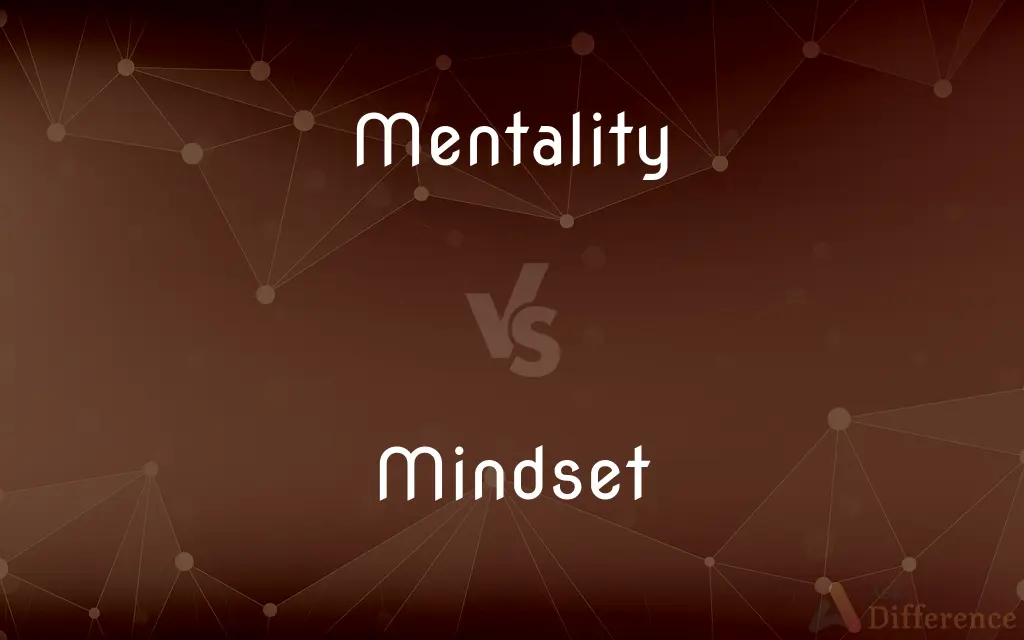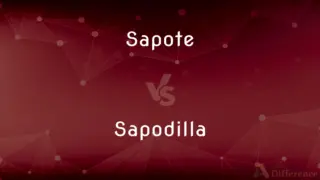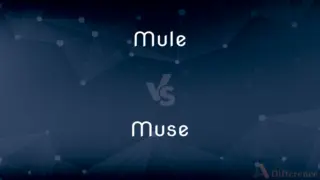Mentality vs. Mindset — What's the Difference?
By Tayyaba Rehman — Updated on October 7, 2023
Mentality refers to an individual's way of thinking or their intellectual capacity, while mindset denotes a person's established set of attitudes or beliefs.

Difference Between Mentality and Mindset
Table of Contents
ADVERTISEMENT
Key Differences
Mentality and Mindset are closely related terms, often used to describe a person's thought processes or attitude. However, they have nuanced differences in meaning. Mentality often refers to an individual's particular way of thinking, or their intellectual capacity. It can encompass broader aspects of cognition, understanding, and intelligence. In contrast, Mindset specifically denotes a person's established set of attitudes or beliefs about certain topics or situations.
When discussing a person's approach to challenges, one might say that someone has a "problem-solving mentality", indicating they naturally think in ways that address issues. On the other hand, saying someone has a "growth mindset" suggests they believe abilities can be developed over time. While both terms relate to thinking, Mentality leans more towards cognitive function and Mindset towards belief systems.
Culturally or societally, Mentality might be used to describe a collective way of thinking. For instance, "team mentality" implies a shared focus on group goals. Mindset, however, often has a more personal connotation. If someone has an "entrepreneurial mindset", it speaks to their individual beliefs about business and success.
In some contexts, Mentality and Mindset can be used interchangeably. However, when delving into specific scenarios or psychological discussions, the distinction becomes clearer. Mentality often feels broader, encompassing general cognitive patterns, whereas Mindset pinpoints particular attitudes and beliefs.
Comparison Chart
Definition
An individual's way of thinking or intellectual capacity.
A person's established set of attitudes or beliefs.
ADVERTISEMENT
Context
Often broader, can be collective.
More specific, often individual.
Scope
Encompasses cognitive function and patterns.
Focuses on attitudes and beliefs about situations or topics.
Usage
Describes thinking processes or intellectual capacity.
Describes established beliefs or attitudes.
Examples
Problem-solving mentality, team mentality.
Growth mindset, entrepreneurial mindset.
Compare with Definitions
Mentality
Intellectual capacity or level.
His sharp mentality was evident in his quick problem-solving skills.
Mindset
An established attitude or disposition.
His defensive mindset was a result of past experiences.
Mentality
A characteristic way of thinking.
Her competitive mentality made her excel in sports.
Mindset
A mental inclination or tendency.
She approached challenges with an analytical mindset.
Mentality
Cognitive patterns or processes.
His logical mentality helped in making rational decisions.
Mindset
A framework through which one views challenges.
Adopting a learner's mindset, he saw every failure as an opportunity.
Mentality
An attitude or outlook towards certain situations.
His positive mentality helped him face challenges head-on.
Mindset
A set of beliefs affecting one's behavior.
Having a growth mindset, she believed she could learn any skill.
Mentality
A collective way of thinking shared by a group.
The team's winning mentality drove them to the championship.
Mindset
An individual's way of thinking based on experiences.
Years of research gave him a scientific mindset.
Mentality
Cast or turn of mind
A vindictive mentality.
Mindset
In decision theory and general systems theory, a mindset is a set of assumptions, methods, or notions held by one or more people or groups of people. A mindset can also be seen as arising out of a person's world view or philosophy of life.A mindset may be so firmly established that it creates a powerful incentive within these people or groups to continue to adopt or accept prior behaviors, choices, or tools.
Mentality
The sum of a person's intellectual capabilities or endowment.
Mindset
A fixed mental attitude or disposition that predetermines a person's responses to and interpretations of situations.
Mentality
A mindset; a way of thinking; a set of beliefs.
Before he can succeed, he will have to shed the mentality that he can get by without hard work.
Mindset
An inclination or a habit.
Mentality
The characteristics of a mind described as a system of distinctive structures and processes based in biology, language, or culture, etc.; a mental system.
Mindset
A way of thinking; an attitude or opinion, especially a habitual one.
Earth Day is a way of propagating and celebrating the environmentalist mindset.
Mentality
Quality or state of mind.
Mindset
A habitual or characteristic mental attitude that determines how you will interpret and respond to situations
Mentality
A habitual or characteristic mental attitude that determines how you will interpret and respond to situations
Mentality
Mental ability;
He's got plenty of brains but no common sense
Common Curiosities
Can mentality describe a group's way of thinking?
Yes, mentality can refer to a shared or collective way of thinking, like a "team mentality."
How do mentality and mindset differ in definition?
Mentality refers to one's way of thinking or intellectual capacity, while mindset pertains to an individual's set of attitudes or beliefs.
Is mindset always individual?
While mindset often refers to individual beliefs, it can also describe a collective group's attitudes in certain contexts.
Is mindset fixed or can it change?
Mindsets can change based on experiences, learning, and conscious effort.
What's an example of a specific type of mindset?
A "growth mindset" is a belief that abilities and intelligence can be developed through dedication and hard work.
Which term is broader in scope, mentality or mindset?
Mentality often has a broader scope, encompassing general cognitive patterns, while mindset focuses on specific attitudes or beliefs.
Can a company or organization have a collective mindset?
Yes, organizations can have a collective mindset that guides their values and behaviors.
Can you measure mindset?
While mindset is subjective, certain assessments and reflections can help gauge and understand one's mindset.
Is mentality innate?
While some cognitive traits may be innate, mentality can be shaped by experiences, upbringing, and environment.
Does mentality always relate to intelligence?
While mentality can refer to intellectual capacity, it also describes general ways of thinking or attitudes.
Is the term "winning mentality" about belief or cognitive function?
"Winning mentality" often refers to an attitude or belief about success and achieving goals.
Are there negative connotations to the word mentality?
While "mentality" is neutral, it can take on positive or negative connotations depending on the context, like "victim mentality."
Can adopting a new mindset affect behavior?
Yes, changing one's mindset can lead to different behaviors and reactions to situations.
How can one develop a positive mindset?
Developing a positive mindset involves self-awareness, reframing challenges, continuous learning, and seeking positive influences.
Can experiences shape one's mentality?
Yes, experiences can influence and shape an individual's mentality or way of thinking.
Share Your Discovery

Previous Comparison
Sapote vs. Sapodilla
Next Comparison
Mule vs. MuseAuthor Spotlight
Written by
Tayyaba RehmanTayyaba Rehman is a distinguished writer, currently serving as a primary contributor to askdifference.com. As a researcher in semantics and etymology, Tayyaba's passion for the complexity of languages and their distinctions has found a perfect home on the platform. Tayyaba delves into the intricacies of language, distinguishing between commonly confused words and phrases, thereby providing clarity for readers worldwide.
















































